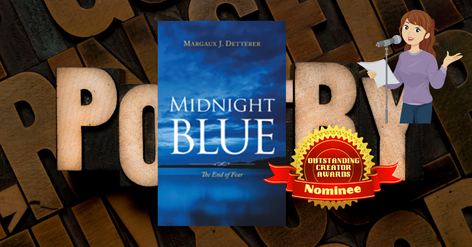|
Score: 93/100 (9.3 out of 10)
When it comes to beautiful, emotional, inspirational poetry, it doesn't get much better than Midnight Blue: The End of Fear by Margaux J. Detterer. This book is about keeping promises to yourself, having faith that everything will work out for the better no matter your situation now, and having the courage to face the future with relentlessness and optimism. Every poem in here is unique and packs a punch and provides something unique and beautiful. Writing about a loved one is nothing new in poetry, but “I'll Be There” is such an elegant, powerful poem about the poet's mother, a mother who raised her after her father passed away. You can really feel the bond and connection that the author and her mother feel for each other, being both mother-daughter and best friends who are always there for each other. But the poem isn't entirely rosy and idealistic, in fact there's some tension and intrigue in it. And we love that. It appears that the poet feels so strongly and thinks so highly of her mother, that she's ridden with fear over letting her down and not being able to live up to her legacy. One thing is for sure: the love between this mother and daughter is raw and real. Our favorite poem in this whole book—and the one that epitomizes its grand, over-arching themes—is “I Am Not Broken.” The reason this particular poem is so incredible is that it effectively puts across two separate and equal—equal and opposite—tones. On one hand, the tone is very dark as it discusses feelings of being alone, defeated, and abandoned. At the same time, it also has an uplifting and inspiration side. Perhaps our favorite line in this poem and the whole book is “I am under construction.” There's something very gritty and relatable about that phrase and concept. We are all under construction in one way or another. It's also a poem about taking personal accountability and responsibility for one's own future happiness or success. Happiness and success aren't things that are just going to be given to the poet, they're things the poet is going to have to fight for and earn. In this poem, the author says that they will own their flaws, failures, and lost battles. That means that they're going to use negative experiences to learn from and build on. They are transforming like a moth or butterfly. Another great part of this poem reads: “I am the light in my darkness / I am the hope in my roughness.” There's a real beat and rhythm to it. The poem “Rise and Shine” is another of our very favorites in this book. The reason is how feisty and fiery this poem is. It's a curb stomp to everyone who has looked down on and abandoned the poet when she needed them. It's a middle finger to the critics, the trolls, and the haters who tried to bring about her downfall. There's a reverse-psychology to this poem as the poet thanks all of these people for the meanness, neglect, and cruelty they showed her because they made her a better person, a stronger person, a wiser person, a more independent person. She thanks a hater for giving her an opportunity to prove them wrong. How great is that? There are a few errors that are pretty easy to overlook. For example, on page 35, you get the phrase “start wonder to yourself” when it should be “start wondering to yourself.” Another time, on page 27, there's the phrase “I fight for you in every breathe” when it should be “I fight for you in every breath.” Those things are easy to overlook. What we have here is a really solid book of poems that you can check out on Amazon!
0 Comments
Leave a Reply. |
Archives
July 2024
Categories |

 RSS Feed
RSS Feed